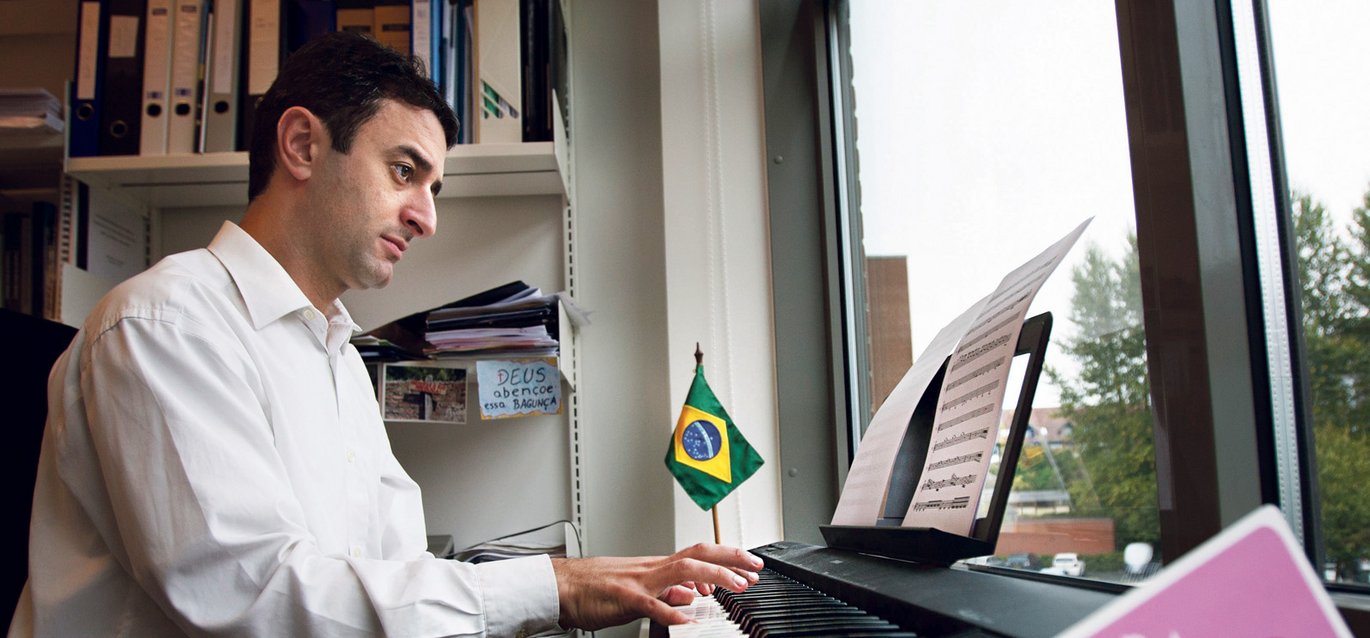A successful Brazilian in Aarhus
Brazilian Studies is becoming a popular subject, and Aarhus University has increased its collaboration with Brazilian universities. One of the people behind the success story is Vinicius Mariano de Carvalho, who used literature and music to get closer to Denmark.

“It’s a good moment for us.”
The comment is made with customary academic modesty. But it cannot hide brazilian Vinicius Mariano de Carvalho’s delight and enthusiasm when talking about the increased interest in his homeland that is becoming evident in Denmark. An interest that is also reflected in the academic world in an increasing number of students and collaboration agreements between the two countries.
de Carvalho has played a part in these developments since being appointed (much to his own surprise) to a two-year position as visiting associate professor in Brazilian Studies at Aarhus University in 2008, after which he was made an associate professor.
“I didn’t know anything about Aarhus, but got quite impressed during my research on the university,” explains de Carvalho, who found both opportunities and challenges in Aarhus.
“Personally I saw an opportunity to develop myself as an academic, but also possibilities for innovative projects regarding Brazilian Studies and especially future collaboration between Brazil and Aarhus University. I can put into work a lot of ideas, and we have the resources and support from Aarhus University,” he says.
A beautiful exchange
The challenge was to attract more students, and this is exactly what has happened. In three years the number of applicants for Brazilian Studies has more than doubled to 71 this year. And as de Carvalho puts it, there is now “quite a beautiful exchange from Bachelor level to highest research level between Aarhus University and Brazilian institutions.”
The exchange scheme is just one result of AU’s collaboration agreements with eight Brazilian universities – including the largest and most prestigious university in Sao Paulo.
There are three members of the Brazilian Studies staff, and de Carvalho is the only one with tenure. But he can draw on a large international network – something which he has used most recently to launch an electronic journal entitled Brasiliana – the Journal for Brazilian Studies, with himself as editor.
“It means more work, but gives a good feedback from all over the world. So what I’m doing makes sense and that’s the important point,” he says.
His biggest mistake
Vinicius Mariano de Carvalho has a PhD from the university in Passau, Germany, and when he moved to Aarhus he was expecting to encounter a culture which resembled German culture.
“That was my biggest mistake and I can’t forgive myself for that because I study cultures. But I began to get into Danish culture through music and literature and discovered many things about the Danish society,” says de Carvalho, who can now read Danish without any difficulty.
The music of Carl Nielsen changed his perspective on Denmark – and the Danish landscape, which looks nothing like the mountainous region in which he grew up.
“There is an interesting connection between the Danish landscape and Carl Nielsen’s music. A sort of harmony that could seem monotone but with magic moments like the sunlight through the trees or the changing colours of the sea,” says de Carvalho, who is also pursuing a career as a professional conductor and music arranger.
Attitudes to foreigners
After four years in Aarhus de Carvalho feels that he has gained a firm foothold in Denmark, and in particular he values the sense of harmony he experiences here.
“People have a curious and in-teresting way to avoid conflicts and try to build up a harmonic environment, and compared to Brazil conflicts in society are very few. I also find the Danish model of cooperative work quite interesting.”
On the other hand, he doesn’t feel that the Danes have quite the same open attitude to foreigners that he believes is one of the greatest qualities of Brazilian culture.
“Danish mentality and especially the sense of privacy can be difficult for a Brazilian. But I can see the value and necessity of that. I normally tell my students when they are going to Brazil: ‘the only different thing there will be yourself, not the Brazilians.’ So I try to work with the same principle myself. I’m the one who is different here in Denmark and it is my job to find a way to insert myself into the Danish culture, even though I’m a foreigner.”
Read more about collaboration with Brazilian universities at au.dk/EN
